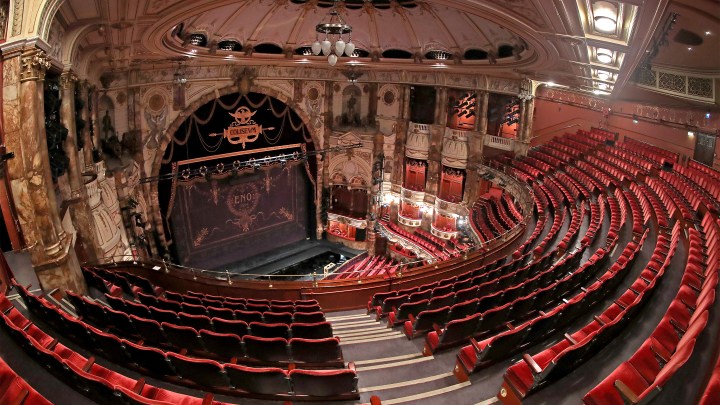
Has the COVID-19 crisis killed live theater in the UK?
Has the COVID-19 crisis killed live theater in the UK?

Tales of woe from unemployed or “resting” actors are nothing new; theirs is the most precarious profession. But due to the coronavirus crisis, theater actors in Britain have far more reason to complain than usual.
Since the middle of March, theater buildings have been closed. While the government has allowed them to be reopened starting Saturday, few observers expect many of the playhouses to bounce back into production soon.

“This has been devastating for me,” said actor Ash Sean Cook. “All my work up to this point has been in the theater. That disappeared overnight, and it really has had a massive impact financially.”

Unable to afford his flat in London anymore, Cook moved in with his partner’s parents in a suburb in the English Midlands. He doesn’t have any auditions to look forward to and is understandably downcast.
“It’s very hard when you’ve spent 10 years of your life, and a lot of blood, sweat and tears, getting yourself to a good position, for that to disappear very quickly,” he said.
Nicole Black, with eight years’ experience as a working actor, concedes that members of her profession have to be prepared for periods of unemployment, but she’s finding the current five-month stretch to be “incredibly tough.”
“All of my work got suspended and canceled. It’s been pretty scary,” she said. “And from what other actors have been telling me, we won’t be going back to work for a while. It’s not a fun time at all.”

That sentiment is shared by less visible members of the theatrical profession — the producers, directors, lighting and sound engineers and other backstage and front-of-house production staff. Black and Cook have worked for a small, successful touring company, Blackeyed Theatre, whose founder and artistic director, Adrian McDougall, describes the current climate as “the worst I’ve known. Our income stopped overnight.”
His company has been building audiences around Britain for a decade and a half. Over the past two years, it’s entertained more than 100,000 people with crowd-pleasing classics like “Sherlock Holmes” and “Jane Eyre.”

McDougall, who at least doesn’t have the financial encumbrance of a theater building to maintain, is trying to revive some of the lost income by live-streaming his latest production: the Gothic tale of “Dr. Jekyll and Mr. Hyde.” But making any money from it will be tough. Britain’s National Theatre has been streaming some of its classic productions with no charge.
“It’s very difficult for us to justify charging even 5 pounds for access to an online show when people have been able to see the best of the best for free,” he admitted.
The same difficulties besetting Blackeyed Theatre have paralyzed what is now a major British industry. Across Britain, in a normal year, some 1,100 playhouses attract more than 34 million paying customers, generating $1.8 billion in annual revenue. London’s West End ranks alongside New York’s Broadway as one of the world’s top two theatrical destinations, and British theater is a vital engine for the wider arts industry, as well. Many of the country’s movie directors, film and TV actors and writers started their creative careers working on or behind the stage.
And yet — due to the pandemic — Britain’s live theater is in serious jeopardy.
“It is an existential crisis,” said Tom Stickland, a policy expert with the Theatres Trust, a public body that works to secure the future of playhouses across the U.K.
“There is a risk that a large number of theaters could go into insolvency when the government’s furloughing scheme [which has been paying the wages of millions of workers during the pandemic] ends in October,” Stickland said.

He doesn’t hold out much hope that many playhouses will reopen immediately after Saturday, since they will be required to observe strict social distancing rules, which will massively reduce the size of audiences.
“From what we’ve been hearing from theater operators, it’s completely unviable to operate at what effectively would be a 25% capacity for their shows,” Stickland said. “Many of them need to be at least 60% full to break even.”
Most theaters are expected to stay closed at least for the rest of the year, and the big fear — especially for small companies like Blackeyed — is that many workers will give up waiting in the wings for the show to go on and drift away from the theater altogether.
“It’s one of the worrying things about this,” said Luke Barton, one of Blackeyed’s star actors who played the master sleuth in the company’s recent production, “Sherlock Holmes: The Sign of Four.” “Who is left in our business? Who will still be able to operate and work? It’s a worrying time.”

In addition to its furlough scheme, which has paid some theater staff wages, the government is pumping almost $2 billion into the arts industry to help it weather the coronavirus crisis. But no one yet knows exactly how that money will be allocated. The concern is that the large, well-known institutions will be showered with cash while small theater groups like Blackeyed are overlooked. That, said Stickland of the Theatres Trust, would be a big mistake.
“For theater to survive, it requires an ecosystem,” he said. “It requires many theaters for tours to visit and it requires all sorts of creative workers to be supported so that we can continue to be a world-leading industry.”
There’s a lot happening in the world. Through it all, Marketplace is here for you.
You rely on Marketplace to break down the world’s events and tell you how it affects you in a fact-based, approachable way. We rely on your financial support to keep making that possible.
Your donation today powers the independent journalism that you rely on. For just $5/month, you can help sustain Marketplace so we can keep reporting on the things that matter to you.












